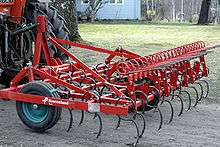Definify.com
Webster 1913 Edition
Harrow
Har′row
(hăr′rō̍)
, Noun.
[OE.
harowe
, harwe
, AS. hearge
; cf. D. hark
rake, G. harke
, Icel. herfi
harrow, Dan. harve
, Sw. harf
. √16.] 1.
An implement of agriculture, usually formed of pieces of timber or metal crossing each other, and set with iron or wooden teeth. It is drawn over plowed land to level it and break the clods, to stir the soil and make it fine, or to cover seed when sown.
2.
(Mil.)
An obstacle formed by turning an ordinary harrow upside down, the frame being buried.
Bush harrow
, a kind of light harrow made of bushes, for harrowing grass lands and covering seeds, or to finish the work of a toothed harrow.
– Drill harrow
. See under 6th
– Drill
. Under the harrow
, subjected to actual torture with a toothed instrument, or to great affliction or oppression.
Har′row
,Verb.
T.
[
imp. & p. p.
Harrowed
(hăr′rō̍d)
; p. pr. & vb. n.
Harrowing
.] 1.
To draw a harrow over, as for the purpose of breaking clods and leveling the surface, or for covering seed;
as, to
. harrow
landWill he
harrow
the valleys after thee? Job xxxix. 10.
2.
To break or tear, as with a harrow; to wound; to lacerate; to torment or distress; to vex.
My aged muscles
harrowed
up with whips. Rowe.
I could a tale unfold, whose lightest word
Would
Would
harrow
up thy soul. Shakespeare
Har′row
,int
erj.
[OF.
harau
, haro
; fr. OHG. hara
, hera
, herot
, or fr. OS. herod
hither, akin to E. here
.] Help! Halloo! An exclamation of distress; a call for succor; – the ancient Norman hue and cry.
“Harrow and well away!” Spenser.
Harrow
! alas! here lies my fellow slain. Chaucer.
Har′row
,Verb.
T.
[See
Harry
.] To pillage; to harry; to oppress.
[Obs.]
Spenser.
Meaning thereby to
harrow
his people. Bacon
Webster 1828 Edition
Harrow
HAR'ROW
,Noun.
HAR'ROW
,Verb.
T.
1.
To break or tear with a harrow. Will he harrow the valleys after thee? Job.39.
2.
To tear; to lacerate; to torment. I could a tale unfold, whose lightest word
Would harrow up thy soul--
3.
To pillage; to strip; to lay waste by violence. [Not used.]4.
To disturb; to agitate.Definition 2026
Harrow
Harrow
See also: harrow
English
Proper noun
Harrow
- a town in north-west London, England.
- a London Borough within Greater London.
- A prestigious public school for boys in the town of Harrow.
- A surname.
harrow
harrow
See also: Harrow
English

Harrow
Noun
harrow (plural harrows)
- A device consisting of a heavy framework having several disks or teeth in a row, which is dragged across ploughed land to smooth or break up the soil, to remove weeds or cover seeds; a harrow plow.
- 1918, Louise & Aylmer Maude, trans. Leo Tolstoy, Anna Karenina, Oxford 1998, p. 153:
- He sent for the carpenter, who was under contract to be with the threshing-machine, but it turned out that he was mending the harrows, which should have been mended the week before Lent.
- 1960, P. G. Wodehouse, Jeeves in the Offing, chapter X:
- “It may be fun for her,” I said with one of my bitter laughs, “but it isn't so diverting for the unfortunate toads beneath the harrow whom she plunges so ruthlessly in the soup.”
- 1969, Bessie Head, When Rain Clouds Gather, Heinemann 1995, p. 28:
- Part of your job would be to learn tractor ploughing and the use of planters, harrows, and cultivators.
- 1918, Louise & Aylmer Maude, trans. Leo Tolstoy, Anna Karenina, Oxford 1998, p. 153:
- (military) An obstacle formed by turning an ordinary harrow upside down, the frame being buried.
Translations
device
|
|
See also
Verb
harrow (third-person singular simple present harrows, present participle harrowing, simple past and past participle harrowed)
- To drag a harrow over; to break up with a harrow.
- Bible, Job xxxix. 10
- Will he harrow the valleys after thee?
- 1719 Daniel Defoe, Robinson Crusoe
- When the corn was sown, I had no harrow, but was forced to go over it myself, and drag a great heavy bough of a tree over it, to scratch it, as it may be called, rather than rake or harrow it.
- Bible, Job xxxix. 10
- To traumatize or disturb; to frighten or torment.
- The headless horseman harrowed Ichabod Crane as he tried to reach the bridge.
- To break or tear, as with a harrow; to wound; to lacerate; to torment or distress; to vex.
- Rowe
- my aged muscles harrowed up with whips
- Shakespeare
- I could a tale unfold, whose lightest word / Would harrow up thy soul.
- Rowe
Derived terms
Translations
drag a harrow over
traumatise, frighten
Etymology 2
From Old French haro, harou, of uncertain origin.
Interjection
harrow
- (obsolete) A call for help, or of distress, alarm etc.
- 1590, Edmund Spenser, The Faerie Queene, II.vi:
- Harrow, the flames, which me consume (said hee) / Ne can be quencht, within my secret bowels bee.
- 1590, Edmund Spenser, The Faerie Queene, II.vi: